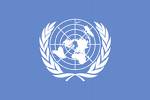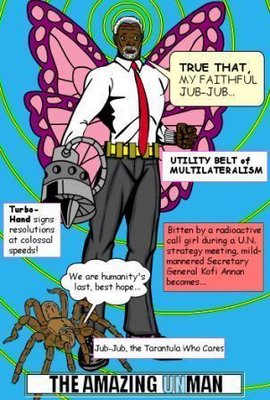 Yesterday the Washington Post editorial page published what amounts to an epitaph of reform efforts at the United Nations, in particular its Human Rights Council. The author described reform efforts aimed at the Council as having 'run amok', and as 'making the old one look good' ("Reform Run Amok").
Yesterday the Washington Post editorial page published what amounts to an epitaph of reform efforts at the United Nations, in particular its Human Rights Council. The author described reform efforts aimed at the Council as having 'run amok', and as 'making the old one look good' ("Reform Run Amok").The old one, we recall, sported the likes of Sudan, China and Libya as Council member states. Attention was successfully diverted from Darfur and Uzbekistan, and focused exclusively on Israeli 'atrocities' in Lebanon and Palestine. The exclusive focus on Israel was possible, according to Mallaby, thanks to Council rules allowing one-third of its membership to effectively run proceedings unilaterally. 17 of the 47 member states happen to be partisans of a so-called 'Organization of the Islamic Conference', and are thus able to sustain their screeching anti-Israel rhetoric while Darfur burns, China and Russia imprison and murder their journalists, and Guantanamo persists.
The editorialist maintains, "For all its faults, the previous U.N. commission occasionally discussed and condemned the regimes most responsible for human rights crimes, such as those in Belarus and Burma. China used to feel compelled to burnish its record before the annual meeting. The new council, in contrast, has so far taken action on only one country, which has dominated the debate at both of its regular meetings and been the sole subject of two extraordinary sessions: Israel."
"[...] Human rights groups that supported the creation of the council, such as Human Rights Watch and Amnesty International, admit to being appalled by the outcome; they nevertheless argue that the panel should be given time to right itself. That could happen, they say, if the democratic members of the council organize and work with the same cohesion as the "unfree" states. They also suggest that the United States, which refused to join the council, reconsider."
Personally, I have tended to withhold judgment on the success or failure of the UN's declared reform efforts given their sweeping and comprehensive nature. They will take time, and lots of dead wood will have to go. One can imagine many insiders will resist the process, like derelict renters facing eviction. [Having waited a full five months to get paid for a job I did for UNICEF in May of this year, I know intimately the unseemly odor and ungainly heft of the UN's administrative dead wood.] But widespread reform is urgent and imperative, and many UN careerists admit this.
Kofi Annan rightly recognized that the logical starting place was to fix one of the most glaring blemishes on the UN's tattered face, that of its infamously dysfunctional Human Rights Council. Why exactly this failed so egregiously is unclear. Mallaby recommends cutting off US funding, as happened to UNESCO in the 1980s. The UN only further undermines its waning credibility by allowing such anti-Zionist forums to abide and prosper.

1 comment:
Hi!,
I’m Fabrizio from Italy (Italian Blogs for Darfur). We’ve translated our
appeal to italian media to speak about Darfur (1 hour only in 2005!).
Can
you support us publishing it on your site, we we’ll be very glad for.
http://www.savetherabbit.net/darfur/?p=18
Please, tell people on the web what we do, it's important to collect a lot
of signs (that are not just signs, but also e-mails sent to italian media!).
Italy is going to sit at The UN Council from January 2007.
tks,
Fabrizio
Post a Comment